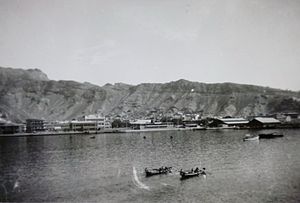1947 Aden riots
| 1947 Aden riots | ||||
|---|---|---|---|---|
| Part of Spillover of the 1947–48 Civil War in Mandatory Palestine | ||||

Aden from the Port of Aden, 1949
|
||||
| Date | 2–4 December 1947 | |||
| Location |
Aden, Aden Protectorate 12°48′N 45°02′E / 12.800°N 45.033°E |
|||
| Causes | Disputes over United Nations Partition Plan for Palestine | |||
| Methods | Rioting, melee attacks | |||
| Parties to the civil conflict | ||||
|
|
||||
| Casualties | ||||
|
||||
The 1947 Aden riot was a three day riot between Aden's Jewish community and Yemeni Arabs in early December 1947 following the approval of the United Nations Partition Plan for Palestine on 29 November 1947. It was one of the most violent scuffles involving Mizrahi Jewish communities in the Middle East in modern times, resulting in the deaths of 76–82 Jews, 33 Arabs, four Muslim Indians, and one Somali, as well as wide scale devastation of the local Jewish community of Aden.
The riots were a significant embarrassment for the British government, particularly given that the British-raised Aden Protectorate Levies were blamed for causing many unnecessary deaths.
By the mid-20th century, Aden was under British rule (today part of Yemen) and had a community of around 5,000 Jews living alongside the Muslim population. In the 1930s, there were rare, religiously motivated outbreaks of anti-Jewish violence and a relatively small riot in May 1932 in which Muslims accused Jews of throwing excrement into a mosque courtyard. Sixty persons, including 25 Jews, were injured but there were no fatalities. The Farhi synagogue was desecrated. In the 1940s, visits of Palestinian Arabs to Aden and expressions of Anti-Jewish sentiments became common. Adenese educated Arab population had become exposed to Egyptian newspapers, as well as radio broadcasts of "Voice of the Arabs" from Cairo, which incited political awareness and prepared the grounds for the anti-Jewish riot of November 1947 and later the 1967 expulsion of the British forces.
On 29 November 1947, the United Nations General Assembly adopted a resolution "recommending to the United Kingdom, as the mandatory Power for Palestine, and to all other Members of the United Nations the adoption and implementation, with regard to the future government of Palestine, of the Plan of Partition with Economic Union", UN General Assembly Resolution 181(II). This was an attempt to resolve the Arab-Jewish conflict by partitioning Mandatory Palestine into "Independent Arab and Jewish States and the Special International Regime for the City of Jerusalem". Following the vote by the UN on partition of Mandatory Palestine, wide scale protests took place across the Arab countries and communities, with Aden being no exception.
...
Wikipedia
